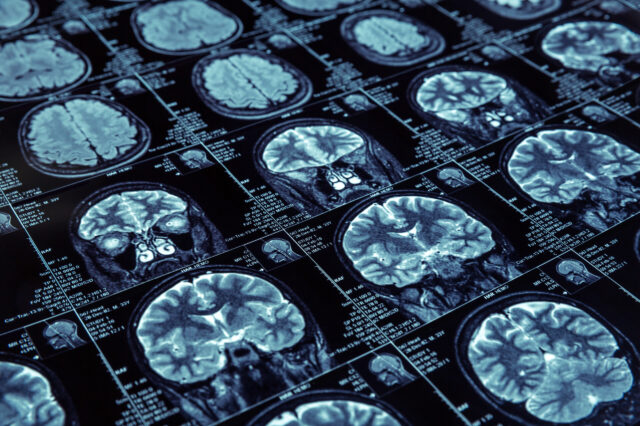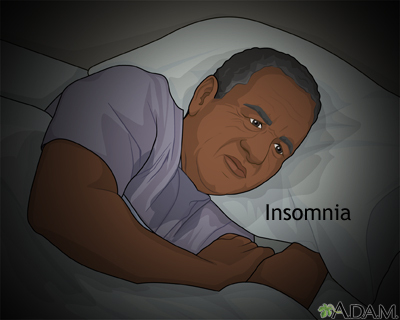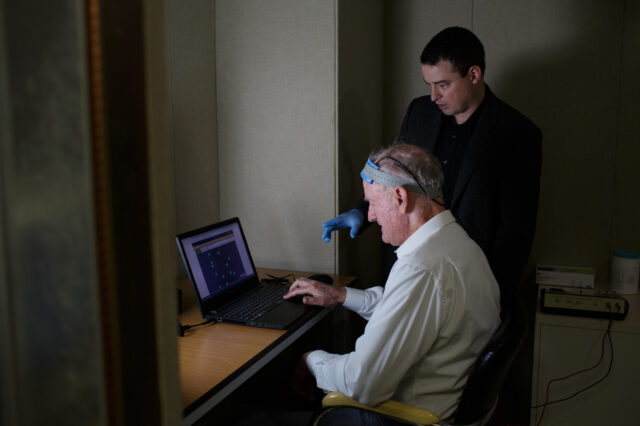Definition
Depression may be described as feeling sad, blue, unhappy, miserable, or down in the dumps. Most of us feel this way at one time or another for short periods.
Clinical depression is a mood disorder in which feelings of sadness, loss, anger, or frustration interfere with everyday life for weeks or more.
Alternative Names
Blues; Gloom; Sadness; Melancholy
Considerations
Depression can occur in people of all ages:
- Adults
- Teenagers
- Older adults
Symptoms of depression include:
- Low mood or irritable mood most of the time
- Trouble sleeping or sleeping too much
- A big change in appetite, often with weight gain or loss
- Tiredness and lack of energy
- Feelings of worthlessness, self-hate, and guilt
- Difficulty concentrating
- Slow or fast movements
- Lack of activity and avoiding usual activities
- Feeling hopeless or helpless
- Repeated thoughts of death or suicide
- Lack of pleasure in activities you usually enjoy, including sex
Remember that children may have different symptoms than adults. Watch for changes in schoolwork, sleep, and behavior. If you wonder whether your child might be depressed, talk with your health care provider. Your provider can help you learn how to help your child with depression.
The main types of depression include:
- Major depression. It occurs when feelings of sadness, loss, anger, or frustration interfere with daily life for 2 weeks or longer periods of time.
- Persistent depressive disorder. This is a depressed mood that lasts 2 years. Over that length of time, you may have periods of major depression, with times when your symptoms are milder.
Other common forms of depression include:
- Postpartum depression. Many women feel somewhat down after having a baby. However, true postpartum depression is more severe and includes the symptoms of major depression.
- Premenstrual dysphoric disorder (PMDD). Symptoms of depression occur 1 week before your period and disappear after you menstruate.
- Seasonal affective disorder (SAD). This occurs most often during fall and winter, and disappears during spring and summer. It is most likely due to a lack of sunlight.
- Major depression with psychotic features. This occurs when a person has depression and loss of touch with reality (psychosis).
Bipolar disorder occurs when depression alternates with mania (formerly called manic depression). Bipolar disorder has depression as one of its symptoms, but it is a different type of mental illness.
Causes
Depression often runs in families. This may be due to your genes, behaviors you learn at home, or your environment. Depression may be triggered by stressful or unhappy life events. Often, it is a combination of these things.
Many factors can bring on depression, including:
- Alcohol or drug use
- Medical conditions, such as cancer or long-term (chronic) pain
- Stressful life events, such as job loss, divorce, or death of a spouse or other family member
- Social isolation (a common cause of depression in older adults)
When to Contact a Medical Professional
Call your provider if:
- You hear voices that are not there.
- You cry often without cause.
- Your depression has affected your work, school, or family life for longer than 2 weeks.
- You have three or more symptoms of depression.
- You think one of your current medicines may be making you feel depressed. DO NOT change or stop taking any medicines without talking to your provider.
- If you think your child or teen may be depressed.
You should also call your provider if:
- You think you should cut back on drinking alcohol
- A family member or friend has asked you to cut back on drinking alcohol
- You feel guilty about the amount of alcohol you drink
- You drink alcohol first thing in the morning
If you or someone you know is thinking about suicide, call or text 988 or chat 988lifeline.org. You can also call 1-800-273-8255 (1-800-273-TALK). The 988 Suicide and Crisis Lifeline provides free and confidential support 24/7, anytime day or night.
You can also call 911 or the local emergency number or go to the hospital emergency room. DO NOT delay.
If someone you know has attempted suicide, call 911 or the local emergency number right away. DO NOT leave the person alone, even after you have called for help.
References
American Psychiatric Association website. Depressive disorders. In: American Psychiatric Association. Diagnostic and Statistical Manual of Mental Disorders. 5th ed. Arlington, VA: American Psychiatric Publishing. 2013:155-188.
Fava M, Østergaard SD, Cassano P. Mood disorders: depressive disorders (major depressive disorder). In: Stern TA, Fava M, Wilens TE, Rosenbaum JF, eds. Massachusetts General Hospital Comprehensive Clinical Psychiatry. 2nd ed. Philadelphia, PA: Elsevier; 2016:chap 29.
Kraus C, Kadriu B, Lanzenberger R, Zarate Jr CA, Kasper S. Prognosis and improved outcomes in major depression: a review. Transl Psychiatry. 2019;9(1):127. PMID: 30944309 pubmed.ncbi.nlm.nih.gov/30944309/.
Walter HJ, DeMaso DR. Mood disorders. In: Kliegman RM, St. Geme JW, Blum NJ, Shah SS, Tasker RC, Wilson KM, eds. Nelson Textbook of Pediatrics. 21st ed. Philadelphia, PA: Elsevier; 2020:chap 39.
Zuckerbrot RA, Cheung A, Jensen PS, Stein REK, Laraque D; GLAD-PC STEERING GROUP. Guidelines for adolescent depression in primary care (GLAD-PC): part I. Practice preparation, identification, assessment, and initial management. Pediatrics. 2018;141(3). pii: e20174081. PMID: 29483200 pubmed.ncbi.nlm.nih.gov/29483200/.






